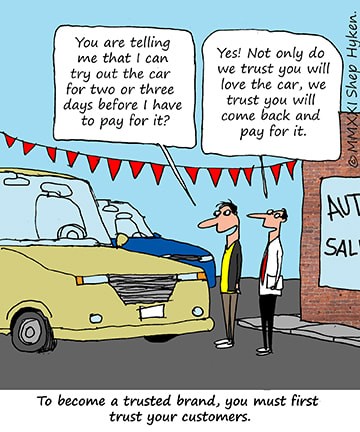|
One of our loyal subscribers, Darrell Grant, The CXO at Hightower Wealth Advisors, shared a great story that provides an excellent learning opportunity. Darrell stopped by a local bakery to pick up some treats for a client. There was a longer than usual line, and some of the customers were becoming frustrated. Apparently, the internet was down so they couldn’t ring up sales. The staff was struggling. The customers were frustrated. That’s when a staff member asked the customers to please be patient, and they excused themselves for about two minutes, stepping away to discuss the problem. Less than two minutes later they returned with big smiles on their faces. They announced to the customers that there was a problem taking payment, but they were happy to let each customer order what they wanted. All they asked was that the customers leave their names and numbers so they could call when the terminals were working and take payment over the phone. The customers were happy to comply. Consider this. The bakery had a choice. Without the ability to take payment, they could close the bakery, or they could trust that their customers to pay later. It’s obvious, the team at the bakery took the customer-focused approach. I worked with a well-known restaurant chain. On occasion, a customer would leave their wallet or purse at home. Once the customer realized their dilemma, the team member would nicely say, “Enjoy the meal. Next time you’re in you can pay for it.” What message do these examples send to their customers? How many businesses do you know that would let you walk out of their store or place an order without paying for it, and then trust you to come back later to pay? In the B2B old, many customers pay 30 or even 90 days (or more) after they are invoiced for whatever they buy, but this is almost unheard of in retail. I’m not suggesting you put all of your customers on the honor system when it comes time to be paid. There needs to be a structure and process in place. But when there is a choice to be made, trust your customers. Sure, there are a few you can’t trust, probably very, very few, so don’t punish the 99-plus percent that is honest because of the sins of these very few. When you trust customers, they reciprocate with their trust. Trust is an important and powerful way to build a better relationship with your customers. My friend Dave Horsager, perhaps the foremost trust expert in the world, says, “Trust, not money, is the currency of business and life.” He also says, “A lack of trust is your biggest expense.” If you can’t trust your customers, you can’t expect them to trust you. Source: business2community.com
0 Comments
Leave a Reply. |
Membership is open to businesses and organizations interested in increasing visibility and brand awareness in Westchester County and surrounding areas.
Archives
May 2024
Categories
All
|


 RSS Feed
RSS Feed